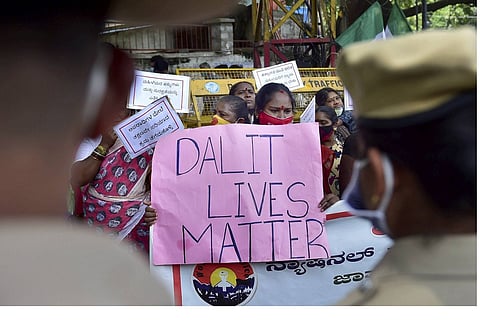

Women and girls from scheduled communities continue to be much more vulnerable to rape than those belonging to other communities, says a report by the People's Union for Civil Liberties (PUCL). The report titled ‘The Scheduled Castes and the Scheduled Tribes (Prevention of Atrocities) Act (SC/ST (PoA) Act), 1989 - Tamil Nadu Scorecard 2021’, which studies the atrocities committed against people of marginalised communities, says that there was an increase in recorded crimes against scheduled communities in 2021 over the previous year. While it states that the rate of recorded crime is much less in Tamil Nadu than the national average, it also takes note of the fact that there is a divergence between the data of the National Crime Records Bureau (NCRB) and those recorded with the state nodal officer for SC/ST (PoA) Act.
“Of 422 recorded rapes in Tamil Nadu in 2021, 123 (29.14%) of the victim-survivors are from the Adi Dravidar communities and six (1.42%) are from the Scheduled Tribes. Given the Adi Dravidar (20%) and ST (1.1%) population in Tamil Nadu, it means that women from Adi Dravidar communities are 50% more likely to be raped by men from other communities (in addition to intra-community rape), than women belonging to other communities in total (by both inter- and intra-community men),” the report finds. It also points out that as the remoteness of tribal communities does not provide adequate protection, these women and children are 29% more likely to be raped (intra-community) than women belonging to other communities (in total).
Recorded rape has increased from one in 33 days in 2011 to one every three days in 2020 and 2021 — a total of 129 cases, of which 94 (73%) involve minor girls, the report further states.

The report also puts forth a sobering reality that ‘more adult women are raped’ in India. However, the situation is the opposite in Tamil Nadu. “Far more girls than women are raped from the Adi Dravidar communities (approximately 3:1) in Tamil Nadu than in all of India, where the ratio is reversed (1:2). Similar is the case of ST girls and women in Tamil Nadu (5:1), and India (1:1.6). This was the case in 2020 as well, where 66% of the victim-survivors were minors. This points unequivocally to the specific targeting of the girls from these communities and their vulnerability,” the report says.
The report also points out that Tamil Nadu is better than the India average in chargesheeting, with the chargesheeting rate for crimes against the Adi Dravidar (84.6%) in the state being slightly higher than the national rate (80%).
While investigations for SC/ST (PoA) Act crimes are supposed to be completed on ‘top priority’ and chargesheets are to be filed within 60 days of the FIR being registered, the report finds that this doesn't happen often. “Of the 592 cases pending investigation on 30 April 2022, over a third (208 cases, 35%) are from 2021 – meaning the investigation has not been completed even after 120 days, which is double the statutory limit.” The report also takes note of the fact that each district in Tamil Nadu has a Social Justice and Human Rights unit exclusively to implement this Act. However, only less than 30% of the chargesheets are filed on time.
Speaking of cases pending in courts, the report finds that there are over 6,175 pending cases after the chargesheet has been filed, of which one case has been pending since 1992. “Almost 5,000 (4,946 to be precise) cases are delayed by more than two years, despite the statutory requirement being 60 days from the filing of chargesheet to judgement. Thirty cases have been pending for over 20 years, and a further 501 cases pending between 10 and 20 years.”
According to the report’s finding, there are 30 designated courts to try cases under this Act in the state, of which 17 are exclusive special courts.
The report also finds a discrepancy of data recorded by the nodal officer and the NCRB.

It reveals that there was an increase in recorded crimes against scheduled communities in 2021 compared to 2020. Stating that there is a sharp increase of 65%, that is from 23 recorded cases in 2020 to 39 cases in 2021, the report says that this might either be due to the lifting of the COVID-19 pandemic-related restrictions, or could be a positive indicator of better recording.
The report looks at the NCRB data for 2021 and replies to RTI requests from the state departments as the main source of this scorecard.